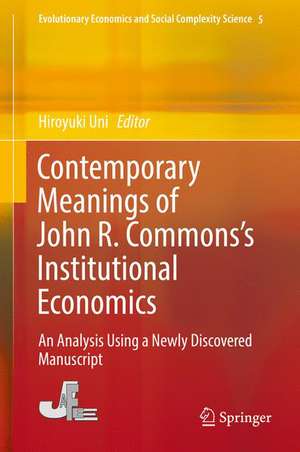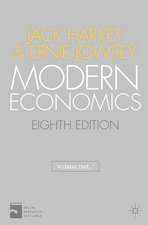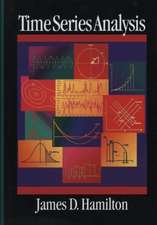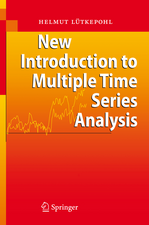Contemporary Meanings of John R. Commons’s Institutional Economics: An Analysis Using a Newly Discovered Manuscript: Evolutionary Economics and Social Complexity Science, cartea 5
Editat de Hiroyuki Unien Limba Engleză Hardback – 13 feb 2017
There is no doubt that Commons's ideas proposed in Institutional Economics such as transactions and collective actions greatly inspired later economists; however, few studies have contributed to comprehensive understanding of the origin of his masterpiece. To what extent and in what sense had Commons rejected or accepted previous classical economics or marginalism for constituting his original institutional economics? What are the meanings and limitations that reasonable value may have for contemporary political economy?
Institutional Economics as attempts to resolve deep economic problems at that time. Commons's efforts create important implications for us, those who are living in an era after the global financial crisis and confronting various challenges to political economy.
| Toate formatele și edițiile | Preț | Express |
|---|---|---|
| Paperback (1) | 724.63 lei 6-8 săpt. | |
| Springer Nature Singapore – 14 iul 2018 | 724.63 lei 6-8 săpt. | |
| Hardback (1) | 730.65 lei 6-8 săpt. | |
| Springer Nature Singapore – 13 feb 2017 | 730.65 lei 6-8 săpt. |
Din seria Evolutionary Economics and Social Complexity Science
- 18%
 Preț: 792.34 lei
Preț: 792.34 lei - 15%
 Preț: 643.84 lei
Preț: 643.84 lei - 18%
 Preț: 723.21 lei
Preț: 723.21 lei - 18%
 Preț: 742.61 lei
Preț: 742.61 lei - 24%
 Preț: 634.35 lei
Preț: 634.35 lei - 15%
 Preț: 639.08 lei
Preț: 639.08 lei - 18%
 Preț: 730.16 lei
Preț: 730.16 lei - 15%
 Preț: 706.48 lei
Preț: 706.48 lei - 15%
 Preț: 583.61 lei
Preț: 583.61 lei - 18%
 Preț: 784.30 lei
Preț: 784.30 lei - 18%
 Preț: 721.01 lei
Preț: 721.01 lei - 15%
 Preț: 527.15 lei
Preț: 527.15 lei - 15%
 Preț: 644.63 lei
Preț: 644.63 lei - 15%
 Preț: 523.22 lei
Preț: 523.22 lei - 15%
 Preț: 638.24 lei
Preț: 638.24 lei - 18%
 Preț: 728.60 lei
Preț: 728.60 lei -
 Preț: 388.90 lei
Preț: 388.90 lei - 18%
 Preț: 737.26 lei
Preț: 737.26 lei - 15%
 Preț: 696.35 lei
Preț: 696.35 lei - 15%
 Preț: 690.11 lei
Preț: 690.11 lei - 15%
 Preț: 692.24 lei
Preț: 692.24 lei - 18%
 Preț: 1006.24 lei
Preț: 1006.24 lei - 24%
 Preț: 570.15 lei
Preț: 570.15 lei -
 Preț: 388.72 lei
Preț: 388.72 lei - 18%
 Preț: 789.52 lei
Preț: 789.52 lei - 18%
 Preț: 1004.81 lei
Preț: 1004.81 lei - 15%
 Preț: 642.68 lei
Preț: 642.68 lei - 18%
 Preț: 729.53 lei
Preț: 729.53 lei - 15%
 Preț: 695.85 lei
Preț: 695.85 lei - 18%
 Preț: 732.52 lei
Preț: 732.52 lei
Preț: 730.65 lei
Preț vechi: 891.04 lei
-18% Nou
Puncte Express: 1096
Preț estimativ în valută:
139.83€ • 145.44$ • 115.44£
139.83€ • 145.44$ • 115.44£
Carte tipărită la comandă
Livrare economică 15-29 aprilie
Preluare comenzi: 021 569.72.76
Specificații
ISBN-13: 9789811032011
ISBN-10: 9811032017
Pagini: 300
Ilustrații: XVIII, 231 p. 20 illus.
Dimensiuni: 155 x 235 x 16 mm
Greutate: 0.53 kg
Ediția:1st ed. 2017
Editura: Springer Nature Singapore
Colecția Springer
Seria Evolutionary Economics and Social Complexity Science
Locul publicării:Singapore, Singapore
ISBN-10: 9811032017
Pagini: 300
Ilustrații: XVIII, 231 p. 20 illus.
Dimensiuni: 155 x 235 x 16 mm
Greutate: 0.53 kg
Ediția:1st ed. 2017
Editura: Springer Nature Singapore
Colecția Springer
Seria Evolutionary Economics and Social Complexity Science
Locul publicării:Singapore, Singapore
Cuprins
Part I: Volitional Theory of Value with Multiple Causations.- 1. Scope of John R. Commons’s Criticism of the Classical Theory of Value: Progress and Limitations in the 1927 Manuscript (Hiroyuki Uni).- 2. From Carl Menger to John R. Commons: Human Volition and Value Theory in Institutional Economics (Natsuka Tokumaru).- Part II: Theories for Social Reform.- 3. The Effect of the Great Depression on the Institutional Economics of John R. Commons (Shingo Takahashi).- 4. Two Methods of Institutional Reform in the Institutional Economics of John R. Commons (Kota Kitagawa).- 5. John R. Commons and Gunnar Myrdal on Institutional Economics: Their Methods of Social Reform (Nanako Fujita).- Part III: Accomplished Dynamic Models.- 6. John R. Commons’s Two Evolutionary Models of Capitalism: Indus-trial Stages and Economic Stages (Takao Tsukamoto).- 7. The Theoretical Connection between John R. Commons and Regula-tion and Convention Theories (Hiroyuki Uni and Takayuki Nakahara).- Appendix: Excerpts from the 1927 Manuscript: Reasonable Value, A Theo-ry of Volitional Economics.
Notă biografică
Hiroyuki Uni, Graduate School of Economics, Kyoto University
Textul de pe ultima copertă
This book is the first to reinterpret John R. Commons's Institutional Economics with a newly discovered manuscript written in 1927 in order to find its contemporary meanings in economic theories. Commons aimed to establish institutional economics to understand capitalism in the USA of that time, when people’s collective actions were gaining importance with the emergence of powerful labor unions, oligopolistic corporations, and national judicial systems. Setting three types of transactions as his central concepts for analysis, Commons described dynamics of capitalism as multiple and cumulative causal processes of transactions, through which the final goal should be achievements of a "reasonable value". He also believed that the reasonable value could be achieved by the evolution of institutions.
There is no doubt that Commons's ideas proposed in Institutional Economics such as transactions and collective actions greatly inspired later economists; however, few studies havecontributed to comprehensive understanding of the origin of his masterpiece. To what extent and in what sense had Commons rejected or accepted previous classical economics or marginalism for constituting his original institutional economics? What are the meanings and limitations that reasonable value may have for contemporary political economy?
Institutional Economics as attempts to resolve deep economic problems at that time. Commons's efforts create important implications for us, those who are living in an era after the global financial crisis and confronting various challenges to political economy.
Caracteristici
Provides the first comparative analyses of J. R. Commons's Institutional Economics published in 1934 and a newly discovered manuscript written in 1927 Clarifies contemporary theoretical meanings of J. R. Commons's Institutional Economics, which contribute to understanding contemporary capitalism Shows J. R. Commons's effort to constitute institutional economics, with important implications for today as established economics is reexamined after the global financial crisis













